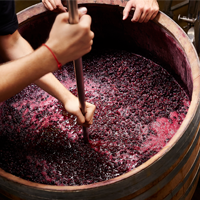The Different Types of Wine

One of the most common questions you may have when you begin considering making homemade wine is what type of wine you should make. There are certainly plenty of different types of wines from which to choose. Understanding the different types of wines can help you to narrow down the choices and select the type that would be best for your first, or your next, batch of wine.
First, it is important to understand that while wine is generally made from grapes, you can actually use practically any type of vegetable matter to make wine. When grapes are used to make wine, they fall into three categories. They are red, white and rosè; a pinkish white wine.
Red wines are not only different in color from white wines and rosè wines but they also have flavors that are stronger and richer. The exact color of a red wine can vary from russet brown to full red to a dark purple color. It is the skin of the grapes that give red wines their color.
White wines typically have a more delicate flavor. The actual color of white wines can vary from the palest yellow to a deep gold. Some white wines can even have a pale green color.
Rosè wines, also known as blush wines, are made with the same grapes as are used in red wines; however, they are submitted to a much shorter period of contact with the skin of the grapes. This results in a delicate blush color.
There are several different types of well known white wines. Chardonnay is one of the most popular types of white wines along with Sauvignon Blanc and Riesling.
Cabernet Sauvignon is one of the most popular types of red wines. Other popular reds include Grenache, merlot, pinot noir and Zinfandel.
It is also important to understand the sugar content of wine. Wines with less amounts of sugar are drier. You have probably noted that wines are classified in the store with numbers 1-3. Higher numbered wines have more sugar and are therefore sweeter.
You should also understand the difference between various types of wines and how they are typically served.
Apèfitif wines are commonly served prior to a meal. They are commonly produced in either herbed or non-herbed varieties. The purpose of this type of wine is to stimulate the appetite; however, they are not frequently served with meals.
Table wine is commonly served with dinner at the table. This type of wine is commonly dry and for a very specific purpose. It is meant to compliment the food instead of compete with it. Typically, a white wine is served with white meat while red wine is served with red meat. The reasoning behind this is that white wine flavors tend to subtle in a similar fashion to the flavors of white meats. Red meats are stronger flavored and do well with red wines, which are also stronger flavored. With a rosè, there is more flexibility. If the wine in question is somewhat dry, it will go with either red or white meat.
Dessert wines, of course, are served at dessert because they tend to be quite sweet. When dessert wines are served at other times, the sweetness of the wine can seem to be overwhelming.
After-dinner wines are also sweet; however, they tend to be served as one would guess; after dinner. While after-dinner wines may be spirits they could also be wines that are fermented. Brandy, sherry, port and liqueurs all fall into this category.


